








BY THE CHAIR OF THE JERSEY POLICE AUTHORITY

“We commend the Force for its forwardlooking use of technology. This year saw the introduction of artificial intelligence capabilities via Microsoft Azure, fully aligned with SOJP’s digital and data strategies. These innovations promise long-term efficiencies and enhanced decision-making, supported by a robust AI governance framework that ensures human oversight remains central to all processes.
HARMAN, CHAIR , JERSEY POLICE AUTHORITY
As Chair of the Jersey Police Authority (JPA), I am pleased to present our Annual Report to the Minister for Justice and Home Affairs. This report outlines the Authority’s work over the past year in fulfilling its core responsibility: to provide independent oversight of the States of Jersey Police (SOJP) and ensure that policing in our island remains effective, efficient, and fully accountable to the public it serves.
Effectiveness and efficiency are central pillars of good policing. Effectiveness relates to how well the SOJP meets its core objectives—preventing crime, protecting the public, supporting victims, and bringing offenders to justice. Efficiency, by contrast, reflects how wisely and resourcefully those outcomes are achieved, particularly how the Force manages its people, systems, and budget to deliver maximum value without compromising quality or public confidence.
In 2024, we evaluated these principles through quarterly scrutiny meetings with the Chief Officer and his senior team, comprehensive performance reviews, and direct engagement with operational and strategic planning. These mechanisms enabled us to assess not only the results but also how they were delivered, ensuring that outcomes were not only achieved but also achieved responsibly and sustainably.
The Authority recognises the considerable efforts made by the Chief Officer and the wider SOJP team in responding to an increasingly complex and demanding operational environment. These efforts have been carried out amidst continuing financial pressures, which pose significant risks to both resourcing and the wellbeing of officers and staff.
As we look to the future, sustaining public confidence while preserving workforce resilience and morale must remain central to policing strategy.
Despite these challenges, 2024 marked a year of meaningful progress. The SOJP launched a refreshed Learning and Development Strategy, adopting a full-lifecycle approach from recruitment through to exit. Notably, localised training for new recruits will commence in 2025. This is an essential step in nurturing home-grown policing talent and supporting long-term workforce planning.
We commend the Force for its forward-looking use of technology. This year saw the introduction of artificial intelligence capabilities via Microsoft Azure, fully aligned with SOJP’s digital and data strategies. These innovations promise long-term efficiencies and enhanced decision-making, supported by a robust AI governance framework that ensures human oversight remains central to all processes.
The implementation of Operation Soteria has significantly enhanced the investigation of rape and serious sexual offences (RASSO). Building on successful outcomes in England and Wales, this initiative – delivered in partnership with the Law Officers’ Department – has increased the effectiveness of investigations and improved charge rates. By year-end, SOJP achieved an 18% charge rate for sexual offences and secured a combined 51 years in custodial sentences for perpetrators of rape. Furthermore, 98% of actions under the Police Violence Against Women and Girls (VAWG) plan were completed, with the remainder either partially complete or under referral.
Looking ahead, the Authority has identified several priority areas requiring continued focus: sustainable resourcing, data integrity, and enhancing victim outcomes. These are not only benchmarks of organisational effectiveness but are essential to the efficient use of public funds and the public’s trust in policing. We will maintain rigorous oversight as progress continues in these critical domains.
I extend my sincere thanks to my fellow Authority Members for their commitment, and to the Minister for their ongoing support. The JPA remains steadfast in its mission to uphold the independence, integrity, and accountability of policing, ensuring Islanders continue to receive a service that reflects their values, rights, and expectations.
SIMON HARMAN, CHAIR, JERSEY POLICE AUTHORITY
As Chief Officer for the States of Jersey Police, it is my privilege to present the 2024 Annual Report. This year’s report details our commitment to maintaining the safety and security of our island community. Over the past year, our dedicated officers and staff have worked tirelessly to uphold the highest standards of professionalism, integrity, and service.
During 2024, we have made significant improvements in various areas of responsibility. Our efforts in crime prevention, community engagement, and emergency response have been exemplary. We have reduced the number of mental health-related incidents requiring police intervention by 34%, thanks to our continuous collaboration with mental health services. This achievement underscores our commitment to addressing root causes not just symptoms to support to our community.
Throughout the year, we have continued to manage several high-profile operations, including Operation Spire (the explosion at Haut du Mont), Operation Nectar (the fatal maritime collision) and Operation Doric (the fatal road traffic collision). Operation Doric concluded with significant convictions, highlighting our dedication to thorough investigations and justice. Operation Spire resulted in three charges for gross negligence manslaughter, while Operation Nectar led to two similar charges. These operations continue to demand substantial resources and underscored our ability to handle complex cases.
In 2024, we investigated 58 rape and serious sexual offences (SSO) complaints, with a total cost exceeding £1 million. In December, we met with the Chief Minister to advise him of the 10% increase in Violence Against Women and Girls (VAWG) cases this year, which marks a 21% increase since 2021 leading to an inevitable increase in workload.
About 20% of what the Force responds to is crime related. Much of our demand concerns welfare issues. Often our police resources are diverted to healthrelated matters. Whilst determined to provide the best service to islanders the police are not always the most appropriate agency to address these matters. We are committed to the ‘Right care, right person’ initiative that involves sign posting callers to our partners agencies who may be in a better position to help.
The field of digital forensics continues to present challenges, with its increasing costs, volume, and demand. The complexity of cases and the large volume of data require considerable resources and expertise, which we are continually striving to enhance.

“As we look forward to the coming year, our focus remains on enhancing our service delivery, embracing innovation, and fostering a culture of inclusivity and respect within our Force.
”ROBIN SMITH, CHIEF OFFICER STATES OF JERSEY POLICE
In 2024 there was an increase in incidents involving missing young people and youth crime. We handled 741 missing person reports, virtually all of which related to young people. The cost of investigating young person crime last year was approximately £1.8 million, highlighting the need for continued focus and resources in this area.
The Government-led ‘Building a Safer Community’ (BASC) initiative remains at the forefront of our efforts to engage with and protect our community. By fostering strong partnerships and proactive measures, such as the Youth Justice Road Map, we hope to create a safer environment for all Island residents.
It would be remiss of me not to acknowledge the greatest highlight of 2024 which was the official visit to Jersey of Their Royal Highness’, King Charles III and Queen Camilla. This joyful occasion was the result of extensive planning and preparation, with the Force playing a pivotal role, ably supported by our Honorary colleagues and other partner agencies. The days leading up to the visit and the event itself, demanded detailed co-ordination to ensure the security and smooth execution of this historic event. Despite these challenges, it was an immense privilege and undoubtedly a career highlight for many to be a part of a defining moment in Jersey’s history and to host Their Majesties. Their presence was deeply significant to all Islanders, and I was immensely proud of our team for their work in making the visit a great success.
As we look forward to the coming year, our focus remains on enhancing our service delivery, embracing innovation, and fostering a culture of inclusivity and respect within our Force. We are committed to building on our achievements and will continue to serve the people of Jersey with dedication and excellence.
I look forward to 2025 supported by the dedicated individuals who make up the States of Jersey Police. Their professionalism, commitment and compassion combined with their relentless sense of duty to the Island makes it a pleasure for me to be their Chief.
ROBIN SMITH, CHIEF OFFICER, STATES OF JERSEY POLICE
The Policing Plan is a strategic vision centred on maintaining public safety and safeguarding those most at risk.
It details key shared initiatives, such as tackling violence against women and girls (VAWG), promoting road safety, and building stronger partnerships to prevent crime and support care-experienced youths.

Our Strategic Vision
In
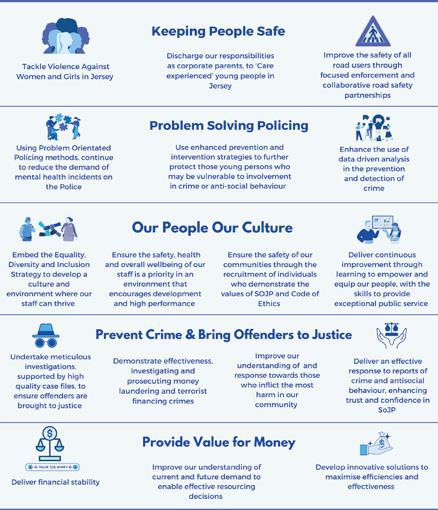
Operational actions are designed to align with these objectives, and draw upon technology, training, and collaboration with partner agencies to deliver results. To ensure the plan’s success, measurable outcomes are clearly defined. These focus on building public trust, reducing youth involvement in crime, and improving community safety. Resource allocation is carefully managed, with officers, and detailed budgeting ensures accountability and efficiency.
In addition to the full Policing Plan, a shortened version called the ‘Policing Plan on a Page’ has been developed to use a guideline for Officers and Staff to be aware of the annual vision. This is also used with their individual development and performance goals. More detailed information on the Policing Plan can be found here: https:// jerseypoliceauthority.je/ our-publications/
VISION - OUTCOME 1: KEEPING PEOPLE SAFE
“Keeping People Safe” in policing refers to the primary mission and responsibility of the States of Jersey Police to protect the lives, well-being, and property of individuals and communities within Jersey.
In summary, “Keeping People Safe” in policing means a comprehensive and multifaceted approach to policing that prioritises the protection and well-being of individuals and communities, fostering positive relationships and trust between the States of Jersey Police and the community we serve. It requires a balance between crime prevention, effective response, community engagement, and adherence to the principles of justice and fairness.
● Target activity at high-risk and high-harm locations, including those associated with the night-time economy to make them safer.
● Target and manage the most dangerous and prolific perpetrators in our community.
● Challenge and address sexism and misogyny within SOJP.
Responding to VAWG offences is a priority for the Government of Jersey, SOJP, the criminal justice system, and public sector partnerships. SOJP are part of the Government VAWG Taskforce, and SOJP continue to work through the recommendations that were identified. There were 10% more VAWG related crimes recorded by the SOJP in 2024 compared to 2023. Victims of crime place trust in us to investigate these offences thoroughly. The charge rate for VAWG in 2024 decreased slightly by 3%. This reflects both the increased number of recorded VAWG crimes and the complexity of these investigations. The proportion of victims supporting a prosecution increased by 3%.
In 2024 SOJP developed and launched a VAWG action plan, and we have completed 98% of the associated actions. The plan has three strands:
● Building trust and confidence This includes challenging sexism and misogyny in policing and working with a range of partners to reach under-represented groups.
● Relentless pursuit of perpetrators. This entails pursuing and actively managing the most dangerous perpetrators in our community and adopting a trauma-aware approach at all levels.
● Focusing on building safer spaces. This describes prevention work online and in private and public premises.
Our night-time economy (NTE) and VAWG initiative ‘Operation Visible’ ran throughout the year, and has prevented offending, created safer spaces and built trust and confidence. Activity is data- and intelligence-led, meaning that locations and individuals are targeted on robust analysis. High visibility patrols aim to provide reassurance and protection to members of the public, and to reduce crime linked to NTE and VAWG. Evaluation of this operation has shown its effectiveness. More NTE crimes were identified by patrolling officers and CCTV operators, recognising the proactive nature of Operation Visible; officers have been in the right place at the right time. Partnership work has added to what we know about harm in the NTE. This has included working with door staff, street pastors, taxi marshals and licenced premises.
We introduced a new operating model called Operation Soteria, which aimed to transform how we investigate rape and serious sexual offences. We hope to build trust, deliver justice, and protect communities by responding to RASSO with unwavering commitment to quality investigations, supporting victims/survivors and a relentless focus on holding offenders to account.
“The programme has been implemented positively in several police forces in England and Wales, aiming to increase the number of rape and serious sexual assault cases reaching charge. This will deliver sustained improvement in the criminal justice whole system response. The programme combines expert knowledge, research insight and transformational change support to police forces. It builds on the completion of a joint action plan with the Law Officers’ Department locally. We ended 2024 with a charge rate for sexual offences of 18%, a figure higher than comparable jurisdictions.”
+10% increase in VAWG investigations (763 to 841) 58 rapes and serious sexual offences (RASSO) 42 Number of rape allegations
111 Number of rapes ‘active and under investigation’ 51 years of imprisonment for rapists (7 convictions)
157 child sexual abuse cases active, under investigation
910 reported Domestic Abuse incidents
220 convicted sex & domestic abuse offenders (an increase of 10 on last year)
Discharge our responsibilities as corporate parents to care-experienced young people in Jersey
● Create a SOJP Corporate Parenting Plan that is informed by engagement with care experienced young people.
● Work in partnership to reduce the number of care-experienced young people in the criminal justice system.
● Train all staff in their new duties and responsibilities under the Children’s Law 2022.
As corporate parents our aim is to improve the lives of care-experienced young people by working in partnership with key stakeholders across the Government of Jersey and safeguarding vulnerable young people.
We have created a Corporate Parenting Plan, informed by engagement with care-experienced young people and collaboration with partners. By raising awareness among SOJP staff of their responsibilities as corporate parents in the form of e-learning modules, we continue to embed working practices. Our approach includes responding to harm, abuse and exploitation early, effectively and in a child-centred, trauma-informed way. We aim to prevent the unnecessary criminalisation of care experience children and young people by preventing escalating criminal behaviour through more effective use of the parish hall system for low level offences.
Part of our aim is also to reduce, where possible, the number of times care experienced young people are detained in police custody. Between January and June 2024, there were 39 detentions of care experienced young people which decreased to 20 between July and December. Part of our Corporate Parenting Plan includes ensuring we respect the rights of care experienced children and young people in our custody suite by providing them with age-appropriate information and access to advocacy.
STATISTICS OF CARE EXPERIENCE YOUNG PEOPLE IN CUSTODY
Improve the safety of all road users through focused enforcement and collaborative road safety partnerships
● Deliver the SOJP responsibilities as set out in the Island Road Safety Strategy.
● Utilise data from all road safety sources, including STATS 19* to deliver our responsibilities under Fatal 5.
Delivering the SOJP responsibilities in the Island Road Safety Strategy was a key focus in 2024, with the aim of improving the safety of all road users in Jersey. Road traffic collisions tragically led to the deaths of three islanders in 2024, underscoring the importance of safety on the roads. We have worked in partnership, and continue to do so, to prevent serious incidents and hold repeat offenders to account. A key element of our partnership with the Infrastructure and Environment Department was the introduction of a new data collection tool called Stats-19, which will allow resources to be allocated to specific locations associated with the most harm.
Part of our responsibility is to proactively Identify and disrupt the ‘Fatal 5’. These are the five most common dangerous behaviours contributing to road incidents and casualties. These are speeding, driving under the influence (of alcohol or drugs), not wearing a seatbelt, careless driving and using a mobile phone whilst driving. We significantly increased (61%) the number of ‘Fatal 5’ offences recorded in 2024 compared to 2023, demonstrating our proactive approach. The introduction of mobile safety cameras will hopefully reduce further the levels of anti-social driving and improve road safety. This workstream is well-underway and is due to be implemented in 2025.
*Stats 19 is a reporting system that facilitates access to and processing of Great Britan’s official road traffic casualty database. The information gathered through Stats19 is used by a variety of organisations, including the DVS, IHE, local authorities, and road safety charities, to improve road safety and reduce the number of accidents on the island’s roads.
The FATAL FIVE refers to the five most common and dangerous behaviours contributing to road traffic accidents and fatalities. These behaviours are:
SPEEDING
Driving above the speed limit or too fast for road conditions reduces reaction time and increases the severity of crashes.
DRIVING UNDER THE INFLUENCE (DUI)
Driving while impaired by alcohol, drugs, or both, which significantly impairs judgment, reaction time, and coordination.
NOT WEARING SEATBELTS
Failure to wear a seatbelt increases the risk of serious injury or death in a collision.
CARELESS DRIVING
This includes a range of behaviours such as tailgating, improper lane changes, and failure to obey traffic signals, all of which can lead to accidents.
USING MOBILE PHONES WHILE DRIVING
Distracted driving, such as texting or making phone calls, reduces the driver’s attention and reaction time, increasing the crash risk.
Addressing these behaviours through education, enforcement, and awareness campaigns can significantly reduce road traffic fatalities and injuries.
56 SERIOUS INJURY ROAD TRAFFIC COLLISSIONS (RTC’S)
675 NO INJURY RTC’S
1083 SPEEDING INCIDENTS

Problem-solving in policing is an approach that focuses on addressing the underlying causes of crime and community issues, rather than simply reacting to criminal and antisocial incidents.
It emphasises collaboration between ourselves, our partners, and the communities we serve to identify and aims to solve problems that contribute to crime and disorder. This approach looks to be proactive and preventive, rather than relying solely on traditional policing methods, such as arrests and prosecutions. It represents a departure from traditional top-down, enforcement-focused policing models, seeking to build trust, enhance transparency, and improve overall public safety through a more inclusive and communityoriented approach.
This method typically follows the OSARA model, which stands for:
1. Objective: What is it that you hope to achieve
2. Scanning: Identifying and prioritising recurring issues or problems.
3. Analysis: Understanding the underlying causes of, and factors contributing to, the problem.
4. Response: Developing and implementing strategies to address the identified issues..
5. Assessment: Evaluating the effectiveness of the response and making necessary adjustments.
This approach encourages officers to tackle causes, not symptoms, focus on long-term solutions, community engagement, and multi-agency partnerships.

Using
methods; continue to reduce the demand of mental health incidents on the Police
● Participate fully in the delivery of the Article 36 suite.
● Enhance effectiveness of the Mental Health Triage team through joint working.
● Further educate SOJP officers and staff to improve joint working.
Article 36 of Jersey’s Mental Health Law allows a police officer to take a person from a public place to a place of safety if the officer believes that the person is suffering from a mental disorder and is in immediate need of care or control.
An “Article 36 Suite” is a place of safety and was opened in September 2024 at Clinique Pinel.
Given that 80% of police demand is noncrime related with 2,441 ‘concern for welfare’ calls received in 2024 by SOJP, this facility will support the *“Right Care, Right Person (RCRP)” approach, which we have now adopted.
80% OF POLICE DEMAND IS ‘NON-CRIME’ RELATED
This approach reduces demand on SOJP by ensuring that the individual receives the right help at the right time by the right agency instead of the police being the default first responder. The new facility has already significantly reduced the amount of time officers spend on taking a person to a place of safety from 7 hours to 3.5 hours on average.
Additionally, the effective use of the Mental Health Triage Team supports the RCRP initiative, and year-on-year has seen an increase from 15% in 2022 to 24% in 2023 and 27% in 2024.
This has meant that the number of mental health incidents police attend has reduced by 13% from 982 to 797. In addition to this was a 9% reduction in the number of Article 36 detentions over the same period.
13% decrease IN MENTAL HEALTH INCIDENTS
SOJP management are represented on the strategic and operational Mental Health Partnership Boards and collaborate with key Mental Health services to enhance the support provided to individuals experiencing such crises. This collaboration has improved the knowledge and skills of police officers handling these cases, which feeds into the regular operational meetings and incident reviews that enable SOJP to provide relevant and timely continuous professional development in this area. To date, officers and staff have received training and guidance on Article 36 detentions, risk management and the use of the 24/7 Mental Health Service linked to the RCRP approach. The new partnership approach introduced in 2024, resulted in a 6% increase (22% to 28%) in reported mental health incidents during 2024, that did not involve or require police attendance.
24%
USE OF MENTAL HEALTH CRISIS TEAM MENTAL HEALTH INCIDENTS
2024 9% decrease ARTICLE 36 DETENTIONS
2441 “CONCERN FOR WELFARE” CALLS
Right Care, Right Person is an approach designed to ensure that people of all ages, who have health and/or social care needs, are responded to by the right person, with the right skills, training, and experience to best meet their needs. It can also focus on the interface between policing and mental health services, as one step towards implementing RCRP.
At the centre of the RCRP approach is a threshold to assist police in making decisions about when it is appropriate for them to respond to incidents, including those which relate to people with mental health needs. The threshold for a police response to a mental health-related incident is:
• to investigate a crime that has occurred or is occurring; or
• to protect people, when there is a real and immediate risk to the life of a person, or of a person being subject to or at risk of serious harm
Article 36 of Jersey’s Mental Health Law allows a police officer to remove a person from a public place if the officer believes that the person is suffering from a mental disorder and is in immediate need of care or control.
A person removed to a place of safety under this Article could be detained for up to 72 hours to determine if any other arrangements are necessary for the person’s care or treatment.
Use
enhanced prevention and intervention strategies
to further protect those young persons who may be vulnerable to involvement
in crime or anti-social behaviour.
● Use the OSARA model and tasking processes for crime reduction.
● Fully implement and review the multi-agency framework for missing young people.
● Implement (in partnership) the new youth justice strategy.
The Community Policing Team (CPT) has introduced and overseen problem-solving activities for several high-demand young people. This has reduced demand on the first responder teams and Anti-Social Behaviour (ASB) levels have fallen by 13%. The CPT continue to manage high demand young people in collaboration with several partner agencies. These problem-solving practices enable SOJP to introduce a multi-agency and trauma-informed approach to policing that is commensurate with the strong community ethos on the Island. A harm reduction plan is in place which seeks to address the root cause of behaviour, to enhance early intervention through diversionary activities and targeted patrols.
As part of SOJP’s responsibility to safeguard islanders, a 2024 review of the police response to missing persons was enacted to ensure that each case is handled with the appropriate level of care and urgency. The changes included the introduction of the *‘Philomena Protocol’, to ensure a swift and co-ordinated response with partners when a child goes missing. This results in a more detailed reporting framework and enhanced risk assessment categories to better manage missing person cases and avoid unnecessary police contact and demand through premature reporting. Due to these changes, the number of young people going missing decreased by 22% compared to 2023, reaching the lowest figure for five years.
The SOJP Deputy Chief Officer sits on the board of the newly revised BASC (Building a Safer Community) Youth Justice Partnership that looks to undertake and embed the work of the Youth Justice Roadmap 2025 to 2030. With youth crime having accounted for almost a quarter of all crime in 2024, SOJP is committed to delivering a multi-agency and child-centred approach that prioritises the best interests of the child and seeks early intervention to prevent offending in the first instance, with the option of robust enforcement where necessary.
*The Philomena Protocol is a scheme that asks carers to identify children and young people who are at risk of going missing, and to record vital information about them that can be used to help find them quickly and safely. The protocol is named after the Patron Saint of Babies, Infants and Youths and was introduced by Durham Constabulary in 2019. It has been successfully implemented in multiple forces nationally. The scheme focuses on the recording of vital information that is required to assist police with a missing person investigation.
Enhance the use of data-driven analysis in the prevention and detection of crime.
● Monitoring of Management of Risk in Law Enforcement (MoRILE) control strategy to inform decisions.
● Participate in the development and implementation of the Building a Safer Community (BASC) framework.
● Increase training, awareness, and use of the OSARA model.
The internal strategic assessment document and MoRILE control strategy now compliment the monthly performance management board meeting, alongside other internal management meetings and tasking mechanisms.
The 2024 MoRILE assessment has enabled SOJP to identify business areas experiencing increased demand, which in turn allows for informed decision-making regarding optimal resource allocation to address emerging threats and future demand.
In 2024, SOJP worked alongside the BASC Team to develop a school’s programme, and to date they have participated in four pilot programmes alongside the Youth Service, focusing on Child Exploitation. This work will continue in 2025 when BASC intend to roll out the education sessions to all the Island’s secondary schools. This is particularly relevant considering the recent convictions of individuals who groomed and forcibly coerced around 50 local children into receiving and holding drugs under the CPT-led ‘Operation Java’, which co-ordinated the multi-agency response to bring down this major drugs importation network.
The Community Policing Team (CPT) has also worked in conjunction with the BASC Team on several problem-solving initiatives and Community Crime Impact Days. One such initiative was the Beach Safe Campaign that targeted crime and Anti-Social Behaviour on our Island’s beaches. The joint working and patrols saw a decrease in instances of crime and Anti-Social Behaviour, compared to previous years, and SOJP received a lot of positive feedback from residents and local businesses regarding the proactive multi-agency approach to advise people and keep them safe.
Officers from the Community Policing Team have received formal OSARA training, delivered by a UK trainer in early 2024. They in turn have disseminated the training to first responders and staff in the Emergency Services Control Centre to enhance their awareness and utilisation of the relevant techniques. Additional training is scheduled for 2025 to really integrate the evidence-based policing approach within the Force.
DECREASE in instances of crime and ASB compared to previous years
Including a section on Our People and Our Culture in the annual policing plan reflects a strategic vision to prioritise the wellbeing, development, and values of the police workforce.
This section recognises that the effectiveness of policing is linked to the strength, morale, and alignment of its personnel with the organisation’s mission and values.
In summary, this section is a strategic investment in the workforce, ensuring that officers and staff are equipped to meet current challenges and supported in fostering a progressive, inclusive, and ethical policing environment. It positions “Our People and Our Culture” as central to delivering effective and community-focused policing.
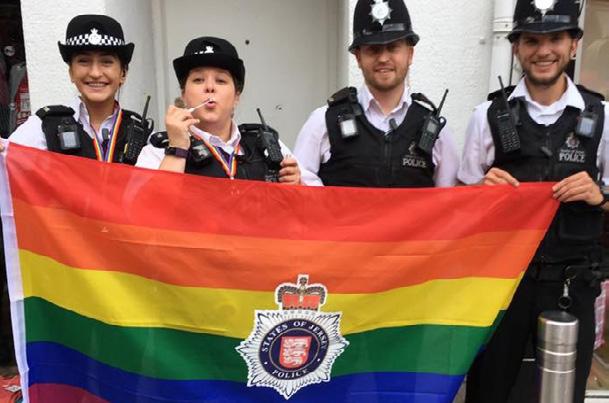
Embed the Diversity, Equity and
Strategy (DEI) 2025-28 to develop a culture and environment where our staff can thrive.
● Develop People & Culture Board (P&C).
● Analyse Be Heard survey and develop an action plan.
● Review SOJP Uniform Policy to ensure that it is representative of EDI principles.
The People & Culture Board chaired by the Deputy Chief of Police brings together a diverse group of SOJP key stakeholders who could represent and drive change for our people. The Board received and reviewed key strategies including Wellbeing, DEI and Learning and Development, and will monitor their progress and delivery plans throughout 2025.
A graph to demonstrate the Be Heard survey 2023-2024
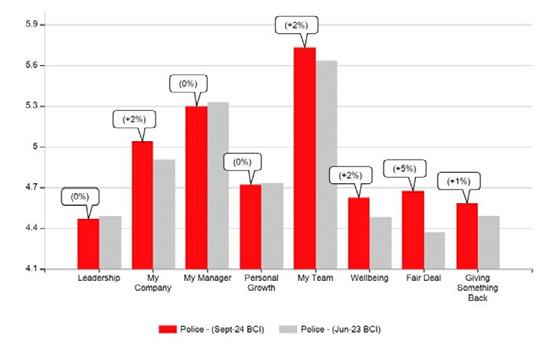
The Board co-ordinated the internal departmental action plans for the 2023 Be Heard survey responses and will continue this work with the 2024 survey results. Overall, the SOJP had improved on the Best Companies 2023 score by 12.5 points and will work to address the feedback received to further improve this score when re-surveyed.
The P&C Board also received a revised uniform policy to align with the diversity of our workforce and further work will be undertaken to finalise this in 2025.
The Diversity, Equity and Inclusion (DEI) Strategy for 2025 – 2028 sets out our approach, which has three key elements; leadership, our organisation, our community and partners. These elements will - centre on the leadership of our Chief and other senior personnel. Focusing on these elements will ensure legal compliance, through ownership and accountability throughout our leadership framework. Implementing practices that can disrupt all forms of discrimination and create a culture of belonging within the SOJP is key to this. Delivering these outcomes will ensure that we will provide a fair and responsive Police service, that engages effectively with our staff, our partners and our communities, and which will build on our organisational values and culture.
Our work was acknowledged with the Chief Officer receiving an Institute of Directors (IoD) Award for Equity, Diversity & Inclusion, Director of the Year.
“A leader’s success is a reflection of
their team’s dedication and hard
work. This award is a testament to the collective efforts of the States of Jersey Police and is truly one for the team.”
ROBIN SMITH, CHIEF OFFICER

Ensure the safety, health and overall wellbeing of our staff is a priority in an environment that encourages development and high performance
● Deliver further awareness of and increased training in TRiM, to all staff. The SOJP Trauma Risk Incident Management (TRiM) policy is a welfare-led process intended to assess the response of a member of staff exposed to a potentially traumatic incident.
● Provide appropriate psychological screening and enhanced support where necessary, to all staff in high-risk posts.
● All line managers to undertake Government developed ‘Wellbeing for Managers’ Training.
● Improve availability and diversity of in-house nutritional provision for all staff.
In 2024 the SOJP increased the focus on all aspects of staff wellbeing. Our support network was strengthened, with more officers and staff self-referring to the Wellbeing Team. This was further recognised following the 2024 Be Heard survey results where there was an overall increase of 2% from 2023, in satisfaction relating to wellbeing and associated matters.
In particular, the SOJP focussed on the increased awareness of and use of TRiM programme – a welfare led process designed to support officers and staff exposed to potentially traumatic incidents, a common occurrence of course within all emergency services.
The Policy was updated to make it a little more user-friendly and all teams were engaged by the Wellbeing Team to ‘bring it to life’. We are pleased to report that, as a result, TRiM referrals were up in 2024. Despite this, further work will be undertaken in 2025, focusing on officer and staff engagement in the formal process. This is outlined within the 2025-2028 Wellbeing Strategy.
Similarly, our psychological screening and supervision processes were further embedded throughout the year. Approximately half of all of our police officers and an increasing number of staff are now operating in roles that are considered to be ‘high-risk’, with frequent exposure to trauma. For example Digital Forensic
staff, Domestic Abuse and Child Protection Officers and Family Liaison Officers.
All of these roles are now subject to mandatory annual psychological screening and a significant and increasing proportion provided with quarterly supervision.
This targeted intervention on a one to one or group basis seeks to identify issues before they arise and to proactively manage and provide support where necessary.
Throughout 2024, and to further guide and raise awareness of all wellbeing matters, we continue to invest in related training.
For example, a current commitment is for all our managers to attend the Government of Jersey developed ‘Wellbeing for Managers’ training.
This will continue under our new Wellbeing Strategy into 2025 and beyond, a new strategy built on the four wellbeing pillars of, Mental Wellbeing, Physical Health, Social Wellbeing and Financial Wellbeing.
Our Four Wellbeing Pillars:
Mental Wellbeing
Physical Health
Social Wellbeing
Financial Wellbeing
Ensure safety of our communities through the recruitment of individuals who demonstrate the values of SOJP and Code of Ethics.
● Continue to rigorously vet our people in line with the Authorised Professional Practice (APP).
● Develop a continuous approach to vetting for current SOJP employees.
● Ensure thorough investigations are undertaking by Professional Standards Department (PSD) where existing members of staff fail to meet the requirements of professional practice and the Codes of Conduct.
The vetting department were strong performers during 2024 delivering vetting checks for all areas of SOJP, the Honorary Police and other key partners. Work continues, in collaboration with key partners, like the College of Policing, to ensure we are aligning with all applicable recommendations from the Angiolini Inquiry, this will continue into 2025.
Throughout 2024 the SOJP vetting department completed over 6,500 enhanced DBS checks on behalf of the UK Disclosure and Barring Service resulting in over 15 disclosures of adverse information to potential employers.
These comprehensive checks are critical to protecting vulnerable islanders.
A further 2,000 vetting checks were completed on behalf of other national and local partners including the Honorary Police, Financial Intelligence Unit, States of Jersey Ambulance Service and the States of Jersey Prison Service.
Initial and on-going police and national security vetting checks were completed on over 100 States of Jersey Police Officers and Staff. Following the output of the Angiolini inquiry, the SOJP Force Management Statement (FMS) was aligned to understand future demands on the Vetting Department and to highlight necessary resources to maintain the high standards required to protect islanders.
6500 ENHANCED DBS CHECKS
15 DISCLOSURES OF ADVERSE INFORMATION
2000 PARTNER VETTING CHECKS
100 POLICE AND NATIONAL SECURITY VETTING CHECKS COMPLETED ON STAFF
● The role of PSD is to investigate all complaints made by members of the public and complaints raised internally, regarding breaches of the discipline code that governs what is acceptable conduct by Police Officers. This includes all death and serious injury incidents (DSI’s). PSD do not investigate conduct of Police Staff, manual workers, contracted staff or volunteers.
● The aim of PSD is to impartially investigate these complaints and reach investigative outcomes which are aligned to the alleged conduct in question. The outcomes span from no case to answer, and no further action being taken, to the most serious of outcomes where disciplinary charges are recommended at a gross misconduct level, and an officer would attend a Chief Officer’s disciplinary hearing for judgement to be passed.
● PSD must also act as the ‘moral compass’ of SOJP to uphold those standards of professional behaviour, to ensure that the trust and confidence of the public is maintained, by the public service that is provided daily. This is also aligned with the Code of Ethics.
What is corruption?
“The improper exercise of power or privilege for the purposes of achieving a benefit for themself, or a benefit or detriment for another person, where a reasonable person would not expect the power or privilege to be exercised for the purpose of achieving that benefit or detriment.”
(npcc counter corruption strategy)
In simple terms corruption is anything that has the potential to corrupt the integrity of policing.
● Policies & procedures, intelligence gathering and training that are aimed specifically at protecting the most vulnerable people from corrupt practices or behaviours, to prevent corruption taking place, whilst protecting the integrity of SOJP’s reputation.
● Integrity health checks are key for the identification of early indicators of vulnerabilities in staff, such as general wellbeing, relationship matters, financial concerns, notifiable associations and business interests.
● Where intelligence indicates there is a corruption risk, the expeditious development of that intelligence is key to negate or confirm risks and deal with them. This is done through covert and overt tactics available to PSD.
The role of the JPCA is to administer effective, independent oversight of the police complaints system and supervise investigations, including death or serious injury matters. Making their decisions entirely independently of the government, the police or other interested groups.
● In 2023, 14 referrals were made to the JPCA of public complaints made to PSD. Some of these referrals are still open to their supervision.
● In 2024, 6 referrals were made to the JPCA of public complaints made to PSD. Some of these are still open to their supervision.
● The JPCA produce their own annual report with further information.
Below is a table displaying the total number of investigations within the States of Jersey Police from 2019 to 2023. This includes both internal and external investigations. (HP) refers to the number of Honorary Police complaints investigated by States of Jersey Police. Investigations into formal complaints are overseen by the Jersey Police Complaints Authority (JPCA). A separate report is published annually documenting their work.
This table and graphic captures the different types of complaints made by categorisation of breaches of the discipline code, for example ‘use of force’. The figures show the percentage of complaints dealt with within that year.
In the last 2 years ‘performance of duties’ has been the most common complaint followed by ‘use of force’.
There have been no reported breaches of the discipline code in the last 2 years specifically related to, sobriety, appearance, fairness and impartiality and lawful orders.
Deliver continuous improvement through learning to empower and equip our people with the skills to provide exceptional public service.
● Develop a Learning & Development Strategy
● Develop a revised model for training new recruits
● Undertake a SOJP Training Needs Analysis
● Continue with the roll-out of the Metropolitan Police Leadership Programme
In 2024, the SOJP unveiled an updated Learning and Development Strategy, presented to the People and Culture Board for review.
This new strategy follows the employee lifecycle from recruitment through to exiting the organisation. This will be ready for implementation during 2025, when we will start recruitment for the first cohort of recruits where training will be delivered in Jersey.
Development of the training plan including lesson plans commenced in 2024 and will continue into 2025. Generative AI has been utilised to increase efficiency in lesson plan preparation.
Further development of the Training Needs Analysis was undertaken defining key training requirements for both officer and staff roles across the organisation. This was utilised to inform the training budget for 2025, to identify statutory and mandatory requirements, for prioritisation.
Training for our leaders also matured with officers at a sergeant rank and equivalent police staff team leaders, being able to access the UK Metropolitan Police Leadership Programme. This is an on-going programme, and further officers will be encouraged to attend in 2025, subject to funding and availability.
STRATEGIC VISION - OUTCOME 4: PREVENTING CRIME AND BRINGING OFFENDERS TO JUSTICE
“Preventing Crime and Bringing Offenders to Justice” clearly focuses on both stopping crime before it happens and effectively dealing with it when it does. The aim is to reduce crime through prevention while making sure those who break the law are held responsible.
Crime Prevention:
This means tackling the causes of crime, reducing the chances of it happening, and taking steps to keep people and communities safe. It involves working closely with partners, raising awareness, and engaging with the public to build safer communities. Using data and technology helps spot risks early and prevent crime more effectively.
Bringing Offenders to Justice:
This involves finding, investigating, and prosecuting people who commit crimes, ensuring they face fair legal processes. Building trust means being professional, open, and effective in handling cases. It also includes supporting victims, listening to them, and ensuring justice is done on their behalf.
Undertake meticulous investigations, supported by high quality case files to ensure offenders are brought to justice.
● Review case file preparation and supervisory oversight and implement recommendations.
Recognising the importance of the Criminal Justice Department (CJD) function and its pivotal position in bringing offenders to justice, an Inspector was embedded within the team to conduct a full review of case file quality and oversee recommendations for improvements. This has been an integral part of the improvement process to drive high quality investigation files and to get case file submissions for Court right first time.
The Inspector has undertaken both group and one-to-one training sessions and as a result, 72% of cases had guilty pleas at first appearance at Court in 2024.
Guiltypleas at frstappearance
A total of 999 individuals faced charges, with 836 cases resulting from police charges. In these cases, 79% of defendants pleaded guilty at their initial Court appearance.
Among the 163 cases charged after advice from the Law Officers Department (LOD), 46% of defendants pleaded guilty at their first Court appearance.
There has been a considerable drop in case file preparation errors in 2024 and thanks to better quality assurance processes before cases are submitted, only 4% have been rejected for more work by the Law Officers Department (LOD).
This is a substantial improvement on last year and more cases (42%) are now being charged at the very first submission stage. With the Inspector in place overseeing the criminal justice process, any case file rejections can be quickly remedied and training provided should it be required.
The focus on improved investigation and case file standards is making a significant difference to both the timescales for completion of an investigation and the judicial outcome.
Police charged investigations took on average 87 days to investigate and charge, and 87% of individuals were found guilty by the end of proceedings, with 3.3% still awaiting trial from 2024.
The additional resource allocated to this important area of business only serves to highlight the commitment by SOJP to solve more crimes and provide swifter justice for victims through the completion of accurate and timely case files. Strong foundations have been laid in 2024 for further improvement over the coming year, which will see an even greater focus on reduced investigation times, robust quality assurance, less victim attrition/ case file discontinuance and enhanced victim satisfaction in criminal justice outcomes.
Demonstrate effectiveness investigating and prosecuting Money Laundering (ML) and Terrorist Financing (TF) crimes.
● Force-wide education on ML, TF and increase parallel investigations.
● Work with key partners to identify trends.
● MoneyVal outcomes and recommendations.
In 2023 SOJP recorded 11 Money Laundering and <5 Terrorist Financing Investigations, whilst launching 55 parallel financial investigations.
In 2024, 13 Money Laundering Investigations and <5 Terrorist Financing investigations were recorded and the number of parallel financial investigations increased to 80.
These investigations are complex and require significant time to investigate.
Our Joint Financial Crime Unit (JFCU) has enhanced its working relationship with other operational units, by assessing each significant drugs operation to determine whether a parallel money laundering investigation can be launched.
Our JFCU continue to deliver a range of training packages to officers and staff within our organisation, as well as educating the public and partners on trends in financial crime. The JFCU continue to work closely with key partners on Island, including the Economic Crime and Confiscation Unit (ECCU), the Jersey Financial Intelligence Unit (JFIU) and the Jersey Financial Services Commission (JFSC), as well as national partners such as the National Crime Agency and the UK City of London Police. A key aim of this collaborative working is to identify trends and typologies within the financial crime landscape and jointly investigate cases across jurisdictions. Jersey’s Fifth Round Mutual Evaluation Report was published after a lengthy period of preparation. It assessed Jersey against international standards set under MONEYVAL, which is the committee of experts on the evaluation of anti-money laundering and financing of terrorism measures. It concluded that Jersey’s effectiveness in preventing financial crime was very strong and demonstrated the Island’s commitment to anti-money laundering and terrorist financing. As a result of MONEYVAL, several strategic and routine working groups have been formulated each with SOJP representation. These groups are ensuring that all MONEYVAL recommendations are being actioned across all agencies. Groups report into the political steering group, which is attended by our Chief Officer.
Improve our understanding of and response towards those who inflict the most harm in our community
STATES OF JERSEY POLICE ACTIONS:
● Develop Organised Crime Groups (OCG) mapping on-island and collaborate with Partners.
Disrupting serious organised crime (SOC) is a priority for States of Jersey Police, because the OCGs who sustain this level of criminality inflict serious harm to the Island. Partnership working between SOJP, Jersey Customs and Immigration Service (JCIS) and national partners enhances our ability to combat this threat.
ForceIntelligenceBureau
In 2024 our Force Intelligence Bureau initiated 13 SOC intelligence operations to develop our understanding of how groups are operating.
This was alongside work that was already being undertaken on two known OCGs. Five operations have so far led to police intervention, which has included arrests, the execution of warrants and charges. Eight operations remain live.
One operation, codenamed Operation Java, focused on investigating a network of younger males who were assisting in the importation and supply of drugs. This was co-ordinated by an older male who arranged importations and controlled the financial arrangements.
The group used threats of violence and coercion to exploit almost 50 children to move drugs, which were hidden in items such as soft toys.
The older male received seven-and-a-half years imprisonment after pleading guilty to these offences. The younger males were sentenced to between two- and three-years imprisonment, with one receiving 100 hours community service. A second OCG has also seen decisive enforcement, through collaboration with JCIS. Multiple individuals remain remanded in custody pending court appearances.
Deliver an effective response to reports of crime and antisocial behaviour thereby enhancing the trust and confidence in SOJP.
● Increased use of data to inform problem solving.
● Enhance crime reduction practices.
January 2024 saw an increase of 85% in acquisitive crime, in particular theft from shops.
The Community Policing Team (CPT) analysed and assessed the cause of this increase and arrested and charged several repeat offenders with 24 offences. In conjunction with this enforcement, crime prevention-accredited officers worked with the stores to improve security and prevent further crime/ASB (anti social behaviour).
Furthermore, they collaborated with the Salvation Army and Caritas to raise awareness about the support available on our Island for communities facing higher living costs. Building on this, the CPT are now engaged with the Town Team. This is a business-led initiative which provides access to partners across the public sector to enhance St Helier’s streetscape and work collaboratively in reducing crime and ASB. This included the Christmas ‘open for business but not for crime campaign’.

The partnership approach led to a 28% reduction in larceny shop offences in 2024 and the detection rate for this offending increased from 42% in 2023 to 57% in 2024.
Another example of evidenced based policing was the work undertaken to identify offenders responsible for a spike in the taking and driving away of motor vehicles month-on-month. SOJP investigated and charged the offenders, which led to a custodial sentence. The CPT further identified that unlocked vehicles were being targeted in public car parks and worked collaboratively with parking control to deliver a “lock it or lose it” media campaign as well as enhanced foot patrols to reduce crime of this nature.
All CPT Officers have received basic crime prevention training from the Police Crime Prevention Academy. This enables the officers to conduct crime prevention surveys for victims of crime and community members. Further to this, four officers are pursuing a national crime prevention qualification as part of SOJP’s commitment to continually advancing its training and improving the services provided to the public. This qualification will help them better understand theories about the causes of crime and to be able to recommend updated advice and security products. It will also equip them to perform comprehensive security surveys of residential and non-residential properties for the benefit of Islanders, with the aim of reducing crime and making our communities safer.
STRATEGIC VISION - OUTCOME 5: PROVIDE VALUE FOR MONEY
Value for Money means making sure public money is used in an appropriate and efficient way to get the best results for the community. In policing, this means providing effective, high-quality services while making the most of available resources—like budgets, staff, and time—to ensure the public gets the best possible return on every pound spent.

● Plan to meet Value for Money (VfM) 2024.
● Deliver balanced budget 2024.
● Government Plan bid for 2025.
● Review Force contract register to ensure Public Finance Manual (PFM) compliance.
The SOJP delivered a balanced budget in 2024, delivering the £422k Value for Money savings required.
The savings and in-year cost pressures were achieved by reducing the Police Constable (PC) headcount in the Community Policing Team (CPT), holding police staff vacancies (circa 10 FTE) and a line by line review of non-pay expenditure.
As SOJP workforce represents circa 91% of the overall budget, reductions primarily largely affects the overall headcount. The non-pay budget continues to be under significant pressure due to the impact of above average inflationary increases e.g. software and utilities.
The current PC establishment has reduced the overall police officer headcount to 201 (1.9 per 1,000 population); lower than comparable jurisdictions who are over 2.1 (e.g. England and Wales, Guernsey, IoM).
Government plan bids for 2025 were suspended with the exception of funding for the major incidents, with financial commitments required to prepare Operation Nectar and Operation Spire for trials. A business case for the major incidents was approved in December 2024 by the Minister for Treasury and Resources following a full debrief on work being undertaken and how this continues into 2025 pre-trials.
The Force Contract Register has been reviewed as part of our efficiencies programme to ensure appropriate commercial arrangements are place. Work continues on a technological solution to link the contract register into core force software platform, but this is subject to prioritisation of development time.
This graphic shows the continued reduction of police officers from the government agreed number of 215, down to the annual affordable headcount of only 201.
To address the £1.6m budget shortfall, SOJP continue to review multiple scenarios including a recruitment freeze in civil servant positions and the realignment of staff in all SOJP departments.
● Produce a shadow Force Management Statement (FMS) in 2024
● Implement the Government of Jersey Connect People module to improve HR data
● Implement the new Force Planning rostering tool
In 2024 SOJP produced our first ‘shadow’ Force Management Statement. This is a robust self-assessment covering all strands of policing from demand and workforce condition to what changes we need to make to deal with future demand. His Majesty’s Inspectorate of Constabulary and Fire & Rescue (HMICFRS) requires all UK territorial police forces to produce an FMS. The SOJP is not required to undertake this but in terms of best practice it is beneficial to gain an understanding of demand, condition of assets, risk and future planning. The process has resulted in a better understanding of future demand, as well as identifying what skills and technology SOJP will need to deliver services and make efficiencies.
The FMS and MoRiLE assessments enable the SOJP to understand its current and future position, driving data-led decision making and to inform recruitment strategies for departments who identify as has having significant resourcing risks.
Connect People was deployed as planned in early 2024. However, funding for the Force Planning rostering tool was unfortunately withdrawn, with no further adaptations or upgrades agreed, despite being nonfunctional for a policing environment. SOJP will pursue an alternative strategy in 2025.
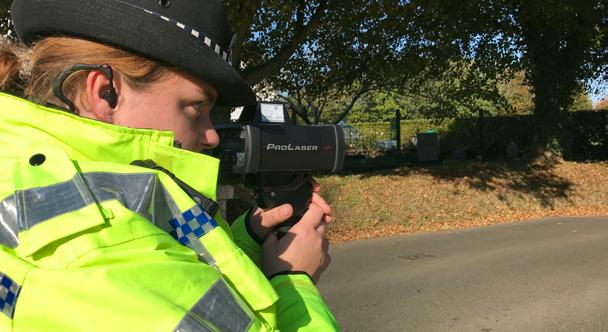
● Implementation of the Law Enforcement Data Service (LEDS).
● Further roll-out the Business Hub model.
● Identify areas and develop solutions where SOJP transactional data can be digitised
● Introduce a quality management framework (QMF) across forensic sciences
LEDS is a major UK Home Office programme to replace the Police National Computer (PNC) with a modern cloud-based data service. PNC was introduced in 1974. It holds personal data including special category data and other information relating to individuals, including arrests, charges, summons and court disposals (including convictions), warnings and whether a person is wanted or missing as well as information about vehicles and stolen property. LEDS will provide police forces and other law enforcement agencies with information at their point of need, removing the need for officers to request information from the control room.
Work on the LEDS programme has proceeded at pace during 2024, setting the foundation for continued roll out in 2025/26.
In 2024, SOJP commenced work with industry partners to introduce our first applications of artificial intelligence (AI) using Microsoft Azure technology, in line with our digital and data strategies. This will ensure our data is held in a common, modern format and will enable advanced analysis and efficiencies to be made in the future. To compliment this, we have developed a strong AI governance framework which puts a ‘human in the loop’ approach at its centre. We will continue to apply AI to create efficiencies and improve service delivery during 2025.

2024 also saw the launch of the new SOJP website, aligning with other UK Home Office forces. The new platform provides us with modern technology that enables us to continue to grow our online capability.
The Business Hub is a software management tool which enables the SOJP to track and manage internal demand for resources such as facilities and travel requests. Further deployment of Business Hub across SOJP departments has helped us to understand our demand, and to plan and resource appropriately. This analysis assists us with developing strategies to deliver further efficiencies, with appropriate governance. The growth reduction has impacted SOJP’s ability to expand the capacity within the Digital Forensics unit. This means that limited progress has been made towards establishing a quality management framework. Funding will remain under review for 2025, but this setback, alongside the recruitment freeze is likely to cause further delays. The JPA will monitor this closely and provide the necessary feedback to the Minister for Justice and Home Affairs.
Throughout 2024, the States of Jersey Police responded to a range of significant events and challenges that tested operational resilience, highlighted the strength of community partnerships, and demonstrated the organisation’s continued commitment to public safety and service excellence.
Here are a few key policing events as well as an introduction to the Community Policing Team with their Parishes.

The visit of His Majesty King Charles III last year was a momentous occasion for Jersey. The success of this event was a testament to the collective efforts of our Force, our partners, and our community, whose dedication and hard work ensured that the visit went smoothly and everyone remained safe. The Chief of Police and His Majesty engaged in meaningful discussions over their shared dedication to public service.
The Justice and Home Affairs Our Stars Awards ceremony brought 2024 to a close where we celebrated the remarkable efforts of our teams.
The group photo from the event captures the camaraderie and pride that define our culture.

During 2024, the Community Policing Team (CPT) took to social media to introduce themselves and encourage interactions from their schools and parishes.

PC Sarah Harrison
Meet your Community Officer’ PC Sarah Harrison the community officer for St Clement and Grouville - Sarah has been a police officer for over 16 years having worked across a number of operational areas and has always lived in the East! Make sure you say hi when you see her.
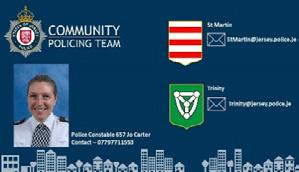
PC Joe Richardson
‘Meet your Community Officer’ PC Joe Richardson looks after the Parishes of St Mary, St Lawrence and St Ouen. Joe is regularly on patrol in his Parishes chatting with everyone so make sure you stop him and say hi!
PC Henry Woolley
Introducing PC Henry Woolley the community officer for St Saviour and St John - Henry is an established member of the CPT and he enjoys working with members of the community and partners to problem solve issues and prevent crime. Make sure you stop him and say hi whilst he is patrolling.
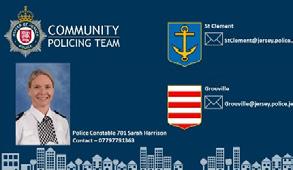
PC Jo Carter
Community Officer for the Parishes of St Martin and Trinity really doesn’t need an introduction as PC Jo Carter has worked within community policing for a number of years now and is so well known throughout the Island and our local Schools that she is literally what Community Policing is all about so make sure you say hi when you see her!


Chloe joins the CPT from Response and she is really looking forward to developing her skills within problem solving & community engagement. Welcome to the team Chloe and good luck in your new role.

In March 2024 our Community Policing Team undertook their first Community Impact Day. These impact days focus on issues raised by the community to the community team. In St Helier Officers engaged with users of electric vehicles about education on safety and legislative requirements – 5 people were stopped on e-scooters and officers seized an electric unicycle where the rider was recorded travelling at 28mph on the cycle path.


We are pleased to announce that PC Chloe Jones has joined the Community Policing Team and will be working as part of the St Helier team.

Our final instalment of ‘Meet your Community Officer’ last but by no means least it’s PC John Shatford he’s already well known in St Brelade and is also responsible for looking after the Parish of St Peter. He’s regularly out on his Police motorcycle, so give him a wave

July 2024 At the St Helier Fete yesterday States of Jersey Police PC Davies whilst on patrol managed to grab a quick chat and photograph with Jersey Honorary Police officers. Officers Pereira, Williams and Bosman were out meeting members of the public and enjoying the sunshine.

Final outturn of £483k underspend including major incident expenditure. £686k was transferred from Reserves to offset overspends within Court and Case Costs.
The underspend on staff costs in 2024 was due to vacancies and resignations throughout the year; all of which was used to meet non-staff cost pressures relating to: building maintenance, inflationary pressures on software licences, fleet leasing and utility costs.
Tight cost control during the year led to lower expenditure than anticipated on the major incidents, delivering high quality investigations and value for money.
The income overachievement of £28k was due to one-off receipts in relation to previous year’s rental charges raised in 2024.
Planning and construction challenges continued in 2024, slowing the progress of the Service’s two main capital projects in 2024; underspends were reprofiled into future years. The rolling equipment replacement budget was almost fully spent; only £73 remained at the year end.
Increase in Staff Turnover Rate – During 2024, the employee turnover rate increased from 6.6% (2023) to 7.0%. 2.1% of this turnover was attributed to Retirement.
In 2024, there was a 0.1% increase in average days sick per employee. This could be attributed to the recording of previously uncaptured sickness category of ‘Surgical’.
In 2024, in response to an audit of crime recording practices, SOJP increased compliance with UK Home Office crime recording standards. In practice, this means that SOJP have increased the number of crimes ‘converted’ as incidents through a process of scrutiny against the crime recording standards.
+6% TOTAL CRIME UP +6%
+33% YOUTH CRIME UP +33% (24% OF ALL CRIME)
+13% 720 RECORDED INCIDENTS OF MISSING YOUNG PEOPLE
+11% 346 RECORDED INCIDENTS OF CHILDREN MISSING
83 YEARS PRISON SENTENCES, 51 FOR RASSO FROM CHILDREN’S HOMES
111 NUMBER OF RAPES ‘ACTIVE AND UNDER INVESTIGATION’
Jan
Feb
March
April
May
June
July
Aug
Sept
Oct
Visits are conducted weekly and all detainees are offered to speak with the volunteers. Typically, about half of the detainees who are offered a visit accept it. We look forward to seeing the data progress and to being able to make comparisons.
The JPA continues to provide the Independent Custody Visitor scheme. Following a successful recruitment campaign, 8 new volunteers were recruited and vetted, and regular unannounced visits have begun monitoring detainee welfare and ensuring that human rights are being met.
The JPA trains volunteers, who follow a code of conduct issued by the Independent Custody Visitors Association, based in the UK.


jersey. police.uk
jersey.police.je